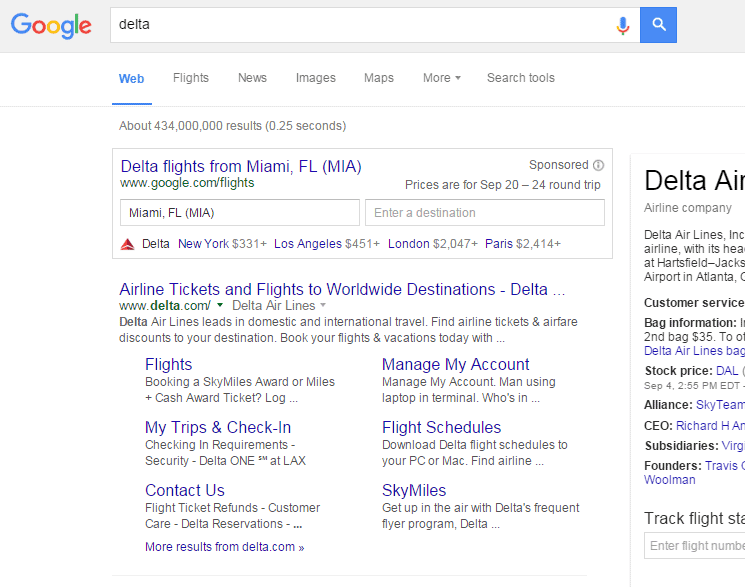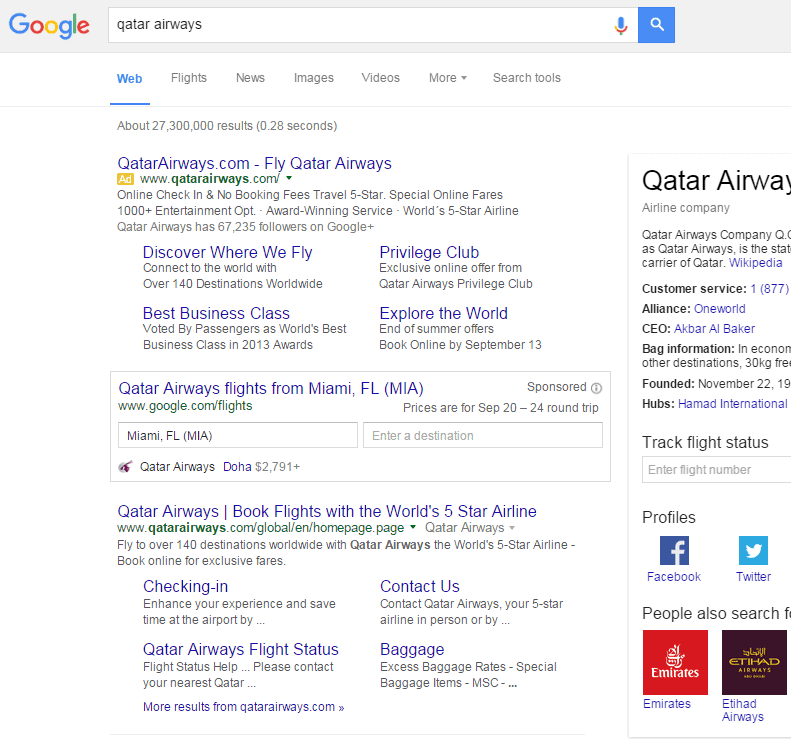This week, Google began displaying their Google flights widget along with results for Branded Searches. Branded searches are queries in which a specific airline is identified, which is often considered to indicate a user’s intention to book (or browse) on a specific carrier’s website. This move is an aggressive one from Google, and is emblematic of Google’s ambitions to expand its influence in the air travel space.
Advertisers of flights have been competing with Google Flights for the past few years, and have surely noticed the significant real estate occupied by those results. Google Flights was originally the product of Google’s $700 Million acquisition of ITA, a leading airline software company in 2011. Many saw this purchase as signaling an intention for Google to move into the realm of MetaSearch Engines and/or OTA’s (or Online Travel Agents) along the lines of Expedia, Orbitz, Hipmunk, Kayak, etc.
For now, Google functions solely as an affiliate, or Meta-Search Engine (MSE), directing traffic to airline.com (a carrier’s website), or to one of the main OTA’s to complete the booking. Of course, along the way, Google adds the necessary tracking codes required to prove attribution and collect their fee. It may only be a matter of time before flights are fully bookable on Google.com/Flights. Google certainly is no stranger to the game of eCommerce processing and fulfillment, but this is undoubtedly a lot more complicated in the airline space.
Until recently, the Google Flights widget has only appeared for Non-Brand Searches (e.g. flights from XXX to YYY). From a pure user experience standpoint, this position is eminently justifiable: Users demonstrate an indication to browse flights between two cities, and Google very efficiently displays the various price-points and flight schedules offered by the main carriers that fly that route.
Google’s decision to display Google Flights results and search box for Branded searches signals a clear intention to compete in airline eCommerce. Users who type in an airline’s name, presumably demonstrating an interest in visiting that airline’s website, are presented first with what looks very much like an Internet Booking Engine (IBE) for searching flights specific to that airline. We suppose airlines can be thankful that the Branded Google Flights results are limited to the airline mentioned in the original search query.
While this widget may arguably provide a more consistent, direct entry into an airline’s booking engine, it also deprives the airline of some significant touchpoints in user’s researching and booking cycle. Airlines spend significant resources in designing, optimizing, and maintaining their website, and most of this work is focused on areas other than the booking engine (whether this may be a misguided approach is a topic worthy of its own blog post).
The most significant impact of Google Flights expansion to the Branded SERP is with respect to customer retention and ownership of customer data. There is a massive war being waged in the air travel industry over customer loyalty, and more importantly, market share. Airlines are focused on customer acquisition and retention, not for the purpose of completing a single transaction, but rather for the life of a customer. In the online world, a robust user experience on airline.com is one of the primary avenues by which the carriers seek to achieve this.
Users who indicate an interest in an airline Brand via search query might reasonably expect to be led to that carrier’s website. However, aggressive competitor bidding by OTA’s has led to a situation where airlines need to pay to ensure their Brand traffic is not diverted from their site by a competitor. Now, they face another potential competitor in Google Flights, a formidable one that ranks itself above organic results. This essentially forces airlines to bid on their own Brand, regardless of whether there are OTA competitors in that space (other than Google, of course). Ultimately, by conditioning users to use their Search Engine as a true starting point for all air travel searches, regardless of brand loyalties, Google is sending a strong message to airlines and OTA’s alike that they intend to be major players in the world of air travel eCommerce.
By: [post_authors_post_link]



